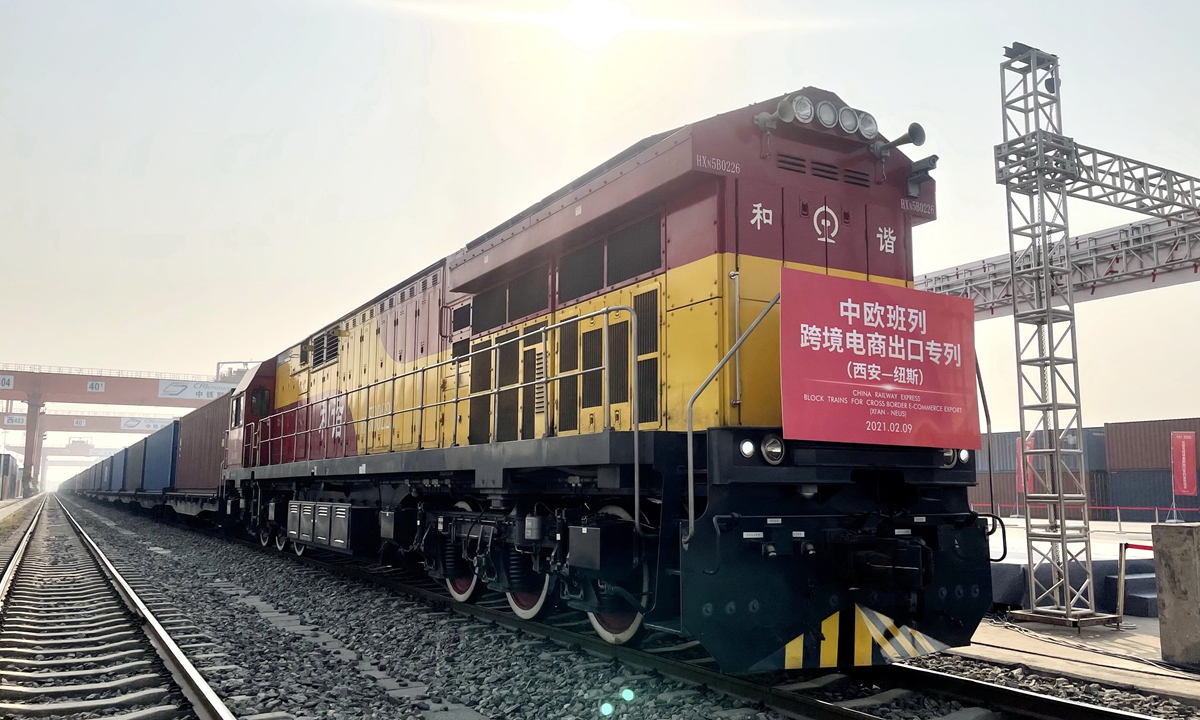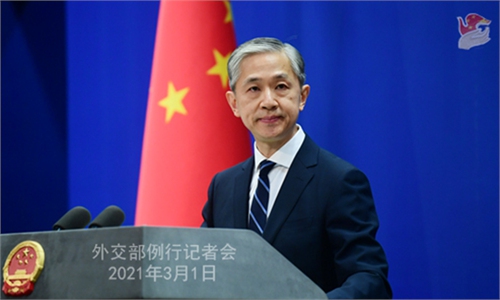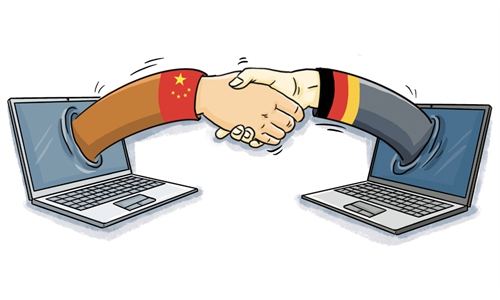
The first China-Europe freight train featuring e-commerce exports since the New Year leaves Xi'an, Northwest China's Shaanxi Province for Germany on February 9, 2021. Photo: IC
With Chinese and German leaders eyeing greater cooperation supposedly underpinned by a transparent and reciprocal investment deal between China and the EU, the business communities of both countries are hoping for greater closeness in areas including trade and supply chains.
The COVID-19 pandemic is far from over, and protectionism persists. As two major global economies that both root for multilateralism and free trade, China and Germany should set an example for openness, mutual benefits and win-win results, Chinese Premier Li Keqiang said on Wednesday, while co-chairing the sixth round of bilateral intergovernmental consultations with German Chancellor Angela Merkel via video link.
The intergovernmental consultation mechanism between China and Germany has long served as a "super engine" in powering bilateral pragmatic cooperation, according to a statement posted on the central government's website on Wednesday, citing the premier.
China has continued its push for reform and opening-up with relevant new measures gradually implemented to benefit companies from across the globe, including German businesses, Li stated, and bilateral trade rose against the trend last year despite the fallout of the COVID-19 pandemic, fully indicative of the enormous potential of bilateral cooperation.
In the first quarter, China's imports from Germany jumped 28.4 percent, while its exports to Germany soared 60.5 percent, media reports said.
A tie-up between the two countries serves the interests of both peoples and bodes well for the stability of global supply chains, according to the premier.
It's a fact that China and Germany hold different views on some issues, but so long as the two sides show respect for each other's core interests and major concerns, and communicate on the basis of treating each other equally and not interfering in each other's internal affairs, favorable conditions will be created for bilateral dialogue and cooperation.
In her opening remarks, Merkel said that bilateral partnerships in diplomacy, trade, agriculture, food security, and responses to climate change, among other areas, have hit new heights.
Germany is willing to work with China to push for vaccine manufacturing and mutual recognition, she stated, noting that the China-EU comprehensive agreement on investment (CAI) is transparent and reciprocal, and it will provide more guarantees for bilateral economic and trade cooperation.
"We were encouraged by the completion of CAI talks" at the end of last year, as the deal's terms such as market opening, sustainable development and national treatment instill hope in both European and Chinese businesses that are still finding their way through the post-virus waters, Duan Wei, chief executive officer of the Chinese Chamber of Commerce in Germany, told the Global Times on Wednesday.
Efforts to ratify the investment deal are being temporarily impeded by a few European parliamentary members' ungrounded criticism using the excuse of human rights in Xinjiang, but this situation is less likely to deal a big blow to industrial and business team-ups between China and Germany, Duan said.
Instead of letting political prejudice distort business cooperation, Germany is shown to be welcoming Chinese firms, notably digital consumer brands, with tremendous fervor, according to the chamber chief, depicting the readily availability of advertisements pitching Huawei, among many other Chinese phone brands, along streets across Germany.
The bulk of Germany-based companies are fully aware of the significance of the Chinese market, where 400 million people of a 1.4 billion population fall into the middle class, Duan said, disclosing that nearly half of the German firms with operations in China achieved rising profits in 2020.
The digital economy, smart manufacturing, artificial intelligence and autonomous driving have been identified as the fields mostly favored by the business communities of the two countries when it comes to partnerships, market watchers said.
BASF will make full use of the new momentum of digitization in the Chinese market with its established expertise on digital transformation in the chemical industry, and actively seize the historic opportunity of a new round of scientific and technological evolution, the Germany-based chemicals giant told the Global Times on Wednesday.
BASF will continue to deepen digital development in the fields of innovation, smart manufacturing, business models and supply chains, and it will bring the development of the chemical industry to the next level, it said.
So far, about 160 digital projects have been launched at BASF's sites in Greater China.
As German manufacturing inches closer to digitization with improved standards, there's a trend toward closer ties between Germany and China in the sphere of technology certification for digital manufacturing, Sheng Honglei, business director of TÜV Nord Group China, a Germany-based supplier of technical services, told the Global Times on Wednesday.
Chinese businesses, for their part, could align with German standards in their manufacturing activities before rising as standard-setters similar to their Germany counterparts and consequently co-leading the global transition toward smart manufacturing, according to Sheng.



